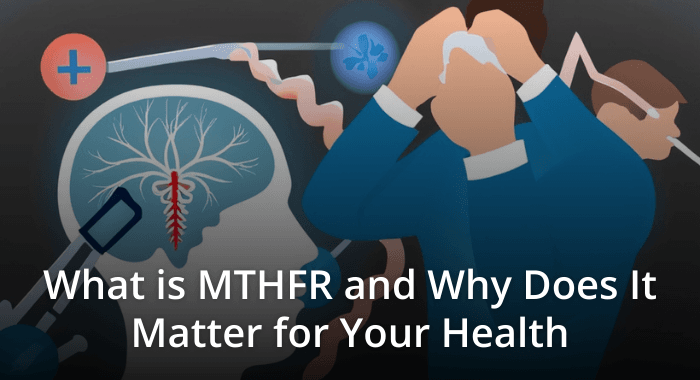It is well known that exercise is good for us, it’s plain to see when we are provided with all the evidence of the benefits one can gain from regular exercise. Although exercise is mostly known for weight-loss, which plays a role in maintaining a healthy balanced life, it can provide us with so much more. Its lesser known benefit, is the reducing of risk in developing certain diseases, well-known examples is the reduction in developing type 2 diabetes and hypertension.
We will be looking at the many benefits that exercise provides and how it affects our physiology, more specifically we will have a look at the lesser known effect of how exercise can play a role in manipulating our genetics. Lastly will we see how exercise can be an invaluable tool for those with MTFHR, and also how it reduces the symptoms of MTHFR providing a better quality of life.
Why is exercise good for us?
Making sure we exercise regularly is great advice for any one regardless of age, sex or physical condition and not just those with ailments or conditions like MTHFR. The benefits gained from exercise is, the maintenance of weight or weight-loss, it provides us with a means to combat or manage diseases especially cardiovascular disease, it plays a role in improving mood by the release of dopamine, it boosts energy by increasing glycogen stores, it promotes better sleep by producing more melanin from the increased dopamine and is also proven to improve brain function and protect memory and thinking ability.
How exercise can change your genetics
The health benefits of exercise are well understood, but the mechanism by which it occurs have been a mystery, until new research found that the mechanism may lie partly in our genetics. Scientists have known that genes are turned on or off as a result of exercise, but they did not know how, until more advancements were made in the field of epigenetics, the process that is integral to gene expression and which proteins are synthesized in the body.
The primary epigenetic process which controls gene expression is methylation, this is the addition or removal of a methyl groups from segments of DNA which either marks it for expression or silencing. It has been known that certain diets or exposure to pollutants may affect methylation and subsequent gene expression, but exercise was not known to cause this until recently.
The study found that when muscles were exercised on only one of a volunteers’ legs, the methylation pattern differed greatly compared to the unexercised leg. What was found was that areas, known as enhancers, which is responsible for the amplification of gene expression, were turned on, notably increasing protein synthesis. Other genetic regions that controlled energy metabolism, insulin response and inflammation were also turned on, suggesting an improvement in strength and endurance.
How exercise benefits those with MTHFR
With this new information, we now see that exercise will increase methylation in areas where it is needed, an important factor for those with a limited methylation capability. Exercise can also aid individuals with MTHFR by boosting the detoxification process, when the heart rate is elevated, faster circulation of the blood allows for toxins to be removed quicker, one means is through sweating.
A common and dangerous, if left unchecked, symptom of MTHFR is the increased level of homocysteine in the body. Homocysteine is methylated to produce methionine, and if the body’s ability to methylate is weakened, as we see in individuals with MTHFR, we will see an increase in homocysteine in the blood plasma. Increased levels of homocysteine contributes to inflammation and plaque formation in the arteries which may lead to coronary heart disease (atherosclerosis). So it is not only important to eat well and supplement with B vitamins, but also to make sure adequate and regular exercise is done to lower the risk of heart disease.
Regular exercise will aid in breaking down the unhealthy fats, amongst other benefits, that may be circulating in the blood stream, this is important for those at risk of coronary heart disease, as these fats may get trapped and build up on sites of inflammation and plaque in the arteries. So the more fats we can burn through exercise the less likelihood it will clog our arteries. Lastly exercise improves heart muscle strength which allows it to pump more efficiently, putting less overall strain on heart function.
Conclusion
Exercise can be divided into four categories each with its own purpose. They are, aerobic exercise which is best for cardiovascular health, Strength training for muscle building, flexibility for maintaining joint motion and balance exercises for core strength and posture. It is recommended for those who have no health conditions that limit their activity should engage in one of three variations at least twice a week to gain the benefits mentioned above.
References:
Brosnan JT, Jacobs RL, Stead LM, Brosnan ME, 2004, Methylation demand: a key determinant of homocysteine metabolism.
<https://www.ncbi.nlm.nih.gov/pubmed/15218538>
Dr Axe, 2017, Improve Your Homocysteine Levels to Protect Your Heart
<https://draxe.com/health/homocysteine-levels/>
Gretchen Reynolds, 2014, How Exercise Changes Our DNA
<https://well.blogs.nytimes.com/2014/12/17/how-exercise-changes-our-dna/?partner=rss&emc=rss>
Arlene Semeco, MS, RD, 2017, The Top 10 Benefits of Regular Exercise
<https://www.healthline.com/nutrition/10-benefits-of-exercise>
Li P and Qi C. Methylenetetrahydrofolate reductase (MTHFR) gene polymorphisms and susceptibility to ischemic stroke: A meta-analysis. Gene. 2014;535:359-64.









